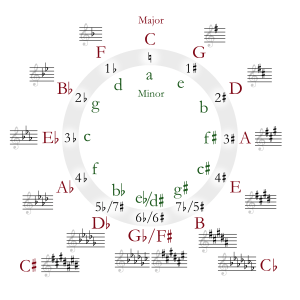G-flat major facts for kids
 |
||
| Relative key | E♭ minor | |
|---|---|---|
| Parallel key | G♭ minor enharmonic: F♯ minor |
|
| Notes in this scale | ||
| G♭, A♭, B♭, C♭, D♭, E♭, F, G♭ | ||
G-flat major is a type of major scale in music. A scale is a series of musical notes played in order. This scale starts on the note G-flat.
Its key signature has six flats. A key signature tells you which notes to play higher or lower (sharps or flats) throughout a piece of music.
The relative minor of G-flat major is E-flat minor. Its parallel minor is G-flat minor. However, G-flat minor is rarely used because it needs many double-flats, which makes it hard to read. Instead, musicians often use F-sharp minor, which sounds the same.
G-flat major also has an enharmonic equivalent, which means it sounds exactly the same as another key but is written differently. Its enharmonic equivalent is F-sharp major. Both keys have six accidentals (sharps or flats) in their key signatures.
Using G-flat Major in Music
G-flat major is sometimes chosen for piano music. Famous composers like Frédéric Chopin and Franz Schubert used it in their pieces, especially for impromptus.
However, it is not often used for music played by a full orchestra. This is because it can be tricky for many different instruments to play together in this key.
The Austrian composer Gustav Mahler was one composer who liked to use G-flat major in his symphonies. He found it a good key for expressing certain feelings in his large orchestral works.
Understanding Scales and Keys
| Diatonic Scales and Keys | |||||||||||||||||||||||||||||||||||||||||||||||||||||||
|---|---|---|---|---|---|---|---|---|---|---|---|---|---|---|---|---|---|---|---|---|---|---|---|---|---|---|---|---|---|---|---|---|---|---|---|---|---|---|---|---|---|---|---|---|---|---|---|---|---|---|---|---|---|---|---|
|
|||||||||||||||||||||||||||||||||||||||||||||||||||||||
| The table shows the number of sharps or flats in each scale. Minor scales are written in lower case. | |||||||||||||||||||||||||||||||||||||||||||||||||||||||
In music, a scale is a set of notes ordered by their pitch. A key is the group of notes that a piece of music is built around. Major keys often sound bright and happy.
The circle of fifths is a way to show how all the major and minor keys are related to each other. It helps musicians understand key signatures and how to change from one key to another.
See also
 In Spanish: Sol bemol mayor para niños
In Spanish: Sol bemol mayor para niños
 | Janet Taylor Pickett |
 | Synthia Saint James |
 | Howardena Pindell |
 | Faith Ringgold |


